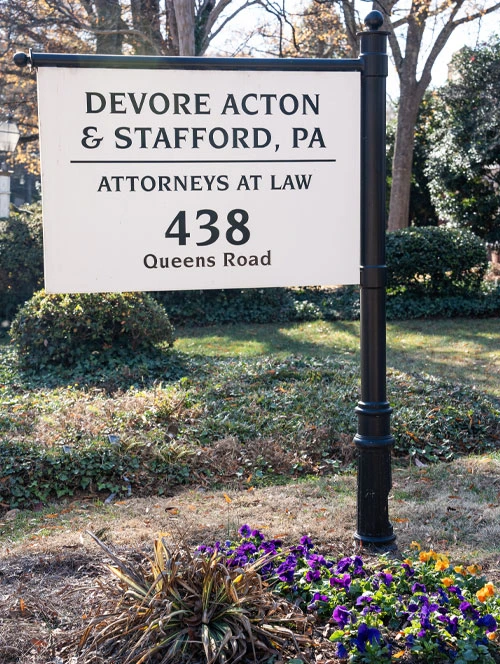North Carolina Map Act Lawsuit Attorney
North Carolina Map Act Lawsuit Lawyer
Purchasing a home, business, or piece of property on which you wish to develop can be exciting. It is an opportunity to bring into reality a vision you have. However, owning land in North Carolina can also come with its own set of challenges, particularly if your land is in an area that could be impacted by eminent domain.
This is the process by which the government offers compensation to a property owner for all or part of their property to develop the land for public use. It is critical to know if your property is subject to such practices before you begin development on it.
This was the goal of the Map Act, which sought to inform property owners of the potential for future development by the North Carolina Department of Transportation. However, at DeVore, Acton & Stafford, P.A., we know that the Act did not live up to its full potential. Property owners who were once identified as protected were left wondering what to do next when their property was condemned and they found themselves victims of eminent domain. For years, we have helped our clients fight back against unjust practices and ensured that their rights remain protected.
What Is the North Carolina Map Act?
In 1987, North Carolina passed the Map Act, which sought to preserve various plans put in place by the Department of Transportation. In the Act, the NCDOT identified areas that would potentially be sites for future infrastructure development, specifically roads, highways, and other transportation needs. Through the Act, the NCDOT sought to limit the property owner’s development of their land to reduce the potential costs of acquisition. This meant that a property owner could not develop on their land without permission, as any development could increase the value of the land.
With the land remaining undeveloped, the NCDOT could research the environmental impacts of their future developments while also creating designs for future projects they wished to enact. Land developments that were specifically prohibited without permission included adding buildings or subdividing their land. To engage in such projects, the property owner would need to gain permission from the state by applying for a variance.
Unfortunately, the Map Act not only impacted the property values for undeveloped properties when it came time to sell, but it also had the unintentional consequence of letting property owners who were not in the development corridors safely assume that they were excluded from cases of eminent domain. For the property owners within the development corridors, they argued that the Map Act essentially took their land by identifying it for future development rather than through the legal process of eminent domain. This has sparked many legal claims since its passage.
Eminent domain practices are not new and are put into practice often. The eminent domain begins when the government seeks to acquire privately owned property to gain land for public-use developments. First, they will condemn the property and then offer the property owner monetary compensation for it. While some owners accept this offer, it is often low and can be challenged in court. Once the eminent domain process has begun, it cannot be stopped; only the compensation can be challenged.
These types of acquisitions allow the government to build parks and public works buildings, preserve historical sites, and engage in other activities.
What If My Property Was Identified in the Map Act?
Recently, courts have ruled in favor of property owners who have been impacted by the Map Act. The courts have agreed with property owners not only in declaring that the Map Act took away the rights of property owners to improve their land, but it also limited the value of their property because of the looming decisions of the NCDOT. In essence, the court established that land had been taken from property owners unjustly and that they should be compensated for such decisions.
In 2016, the legal claims led lawmakers to reevaluate the Map Act, and they subsequently rescinded the Act and removed the Protected Corridor Maps. Property owners who have been impacted by these decisions, both before and after the Act was rescinded, and those who own impacted property have a right to legal assistance from an attorney, who may be able to help recover damages from the impacts of the Map Act.
How Specifically Did the Map Act Impact Property Owners?
Because the Map Act prevented property owners from developing on their own land without permission from the state, it raised a number of issues, including the Constitutional legality of such a law. When it was passed, it:
- Prevented property owners from improving their land, even though it was privately held
- Prevented property owners from receiving fair value for their land if they chose to sell it
- Caused the land to consistently appraise under normal market value increases
- Prevented property owners from utilizing the land as they wished
- Created restrictions on the land that ultimately made it unmarketable for sale
These limitations have sparked hundreds of claims. While each claim is taken independently, and the circumstances of each case may be different, many property owners have been successful in recovering compensation that otherwise would have been lost because of the Map Act.
The Constitution does allow government agencies the right to take property from citizens for public use if the property owner is given fair compensation. Unfortunately, in cases of eminent domain, compensation is often not offered at the appropriate market value. In cases involving the Map Act, NCDOT’s development corridors essentially took the land from property owners before they were compensated.
What Compensation Are Property Owners Entitled To?
If your property has been impacted by the Map Act, you will want to consult with an attorney. They can help you understand the circumstances of your case and what you may be entitled to recover. The first step is to bring an inverse condemnation claim against the NCDOT as well as against any other parties involved. An inverse condemnation claim is used in cases of eminent domain in which a property owner feels like they have not been offered just compensation in the taking of their property.
Once the claim is filed, you will have the right to a trial by jury, in which the evidence will be presented and the jury will decide if you are eligible for compensation. Should you be successful in your claim, you are not only entitled to fair and just compensation for your land, but you also may be entitled to 8% interest from the time the land was taken, along with the back taxes that may be owed due to the change in land value.
The timeframes involved in Map Act cases are generally assumed to be the time in which the property was listed on a corridor map. However, the specific circumstances of your case may vary depending on the date on which you purchased the land.
In addition, cases of eminent domain, including claims involving the Map Act, allow the property owner to ask for attorney fees to be included as part of the compensation.
In some cases, you may enter into mediation rather than a jury trial. In cases that involve mediation, an independent third party will seek to help you and the entity you are filing the claim against reach a reasonable agreement, forgoing the necessity of a jury trial.
Should I Make a Claim?
Cases of eminent domain can be difficult because your options seem limited, as others have made the decisions about your land without considering its impacts on you or your family. However, eminent domain, particularly in the form of the Map Act, deserves to be challenged to ensure that the compensation you receive is just.
Property owners impacted by the Map Act have repeatedly shown that their rights were not met, and they have been receiving compensation for the unjust treatment they received as a result of the development corridor maps.
Whether your property has been condemned in an eminent domain case or the threat has hung over you as a result of the Map Act, you should speak with an attorney. They can help you understand your options and what finances you may be able to recover. Because attorney fees are often part of the settlement, the cost of fighting for your rights will be borne by someone else.
North Carolina Map Act Attorney
Understanding how the Map Act may have impacted your property can be confusing. You may be wondering if you are entitled to compensation because your property was once identified in a development corridor. If you or a loved one has owned property that was a part of the NCDOT corridor maps, you should speak with a skilled and experienced real estate attorney. At DeVore, Acton & Stafford, P.A., our team has been helping clients across North Carolina recover money owed as a result of the Map Act or from any eminent domain case. We understand the rights of our clients as property owners. Let us help you get the answers that you deserve. Contact our offices

request your consultation
"*" indicates required fields



